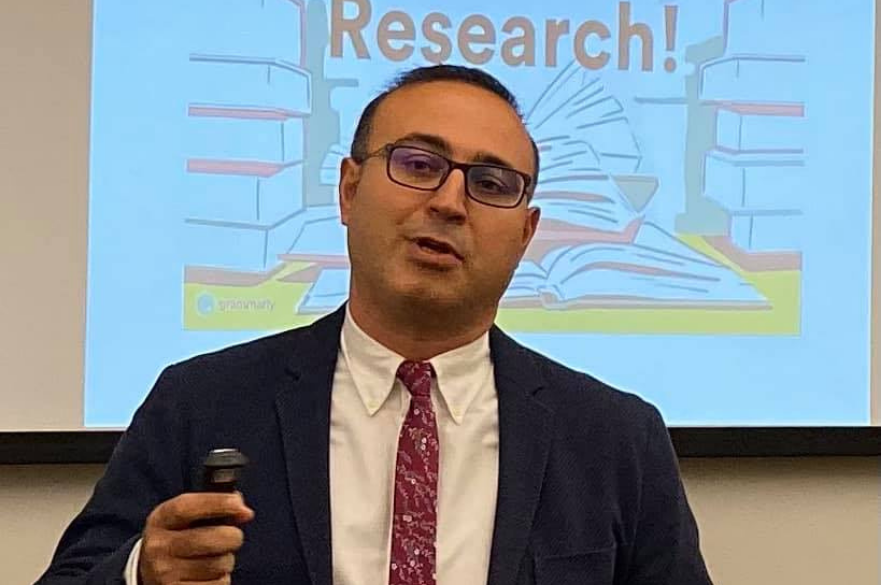Organisations should build on pandemic social media messaging to retain customer trust in times of crisis
A study which examined the corporate social responsibility (CSR) messaging of Fortune 100 companies on Twitter during the pandemic has found that organisations could better communicate with their customers during times of crises by strategically embedding their CSR response into international marketing plans.
By Helen Breese | Published on 16 September 2022
Categories: Press office; Research; Nottingham Business School;

Researchers from Cyprus University of Technology, Ctl Eurocollege, Cyprus, Nottingham Trent University (NTU) and the University of Sheffield analysed 2,858 CSR-related tweets across 93 international companies between 1 February 2020 and September 2021. The sample included 20 from the technology sector, 18 from medical and health, 15 from financial services, 13 from transportation and services, 11 from retailing and the remainder from a variety of other sectors.
During the pandemic, the companies tweeted messages related to their relief actions, programmes and campaigns in response to Covid-19 pandemic. However, researchers saw that not all companies integrated and coordinated their communications channels and strategies to deliver a clear, consistent, and compelling message about their organisations.
Babak Taheri, Professor of Marketing at Nottingham Business School’s Marketing and Consumer Studies Research Centre, said: “For many organisations, CSR messages are largely related to internal issues or campaigns, designed to improve reputation and build trust among their stakeholders. However, the pandemic provided organisations with a platform to regularly communicate a variety of additional CSR messages.
“Existing research mostly concentrates on the outcomes of CSR, while the communication of CSR strategies during the pandemic remains largely under-researched. We explored the how, what, and why of messaging and found that companies were motivated to communicate their CSR activity during the pandemic for a number of reasons, including to highlight their organisational values; to improve their reputation during a time of crisis; and to act responsibly towards their customers and society.
“There is now an opportunity for the positive CSR practices which emerged during the pandemic to be improved and embedded into long-term strategic marketing plans, rather than as an on-off response to any similar crisis in the future.”

Professor Babak Taheri
In light of the findings, the research suggests organisations adopt a proactive, engaging approach to CSR communication to be ready for future crises.
This includes using available data and technology to improve CSR communication strategies by offering, for example, more relevant, targeted, influential and creative messages to audiences.
It is recommended that CSR strategies should be communicated as SMART objectives - specific, measurable, achievable, relevant, and timed - and organisations should be more specific on how they have been more agile and adaptive against crises. This approach can build consumer trust in international companies, particularly as global corporations may be met with criticism over their legitimacy in operating beyond national boundaries.
The selected CSR response plan to a crisis should be in line with the general marketing plan as well as the vision of the business. In other words, audiences may not positively engage with a CSR response plan that is not aligned with the company value, mission, and vision
Depending on the type of crisis, its impacts on communities may vary from local to international scale, so agility in developing marketing commutation strategies against global crises is needed.
The effectiveness of the CSR campaign should be evaluated using rigorous measures to be able to improve future communication plans. Audience feedback should be collected both during and after the crisis through establishing a dialogue and integrating their views in CSR communication and response plans.
Professor Taheri added: “Consumers are much more aware of CSR in recent times and companies must ensure their strategies make a real difference to society. The sampled companies are recognised as CSR champions in their industries, as such they are expected to revisit their internal policies to not only ensure CSR is a fundamental part of their DNA but also of their company vision, mission, marketing plan and marketing communication plan.
“Thus, we recommend to policymakers developing contingency strategy plans for emergency communication management, particularly for international crises, as they need to remain socially responsible and accountable to their stakeholders both in normal and challenging times.”
For further information on the Marketing and Consumer Studies Research Centre at Nottingham Business School visit the website, Twitter or LinkedIn.
Notes for Editors
Press enquiries please contact Helen Breese, Public Relations Manager, on telephone +44 (0)115 848 8751, or via email.
About Nottingham Business School at Nottingham Trent University
Nottingham Business School (NBS) at Nottingham Trent University (NTU) is a leader in experiential learning and personalisation of business, management and economics education and research, combining academic excellence with positive impact on people, business and society. NBS has an unrivalled level of engagement with business, public and voluntary organisations. With more than 8,000 students, NBS is also one of UK’s largest business schools.
NBS is Quadruple+ Accredited by EQUIS, AACSB, EFMD BA for International Business, which are globally recognised hallmarks of excellence and quality for business education. NBS is also accredited by Small Business Charter, providing support and development for SMEs. The school is also a PRME Champion and held up as an exemplar and beacon by the United Nations Principles of Responsible Management Education (PRME).
About Nottingham Trent University
Nottingham Trent University (NTU) received the Queens Anniversary Prize for Higher and Further Education in 2021 for cultural heritage science research. It is the second time that NTU has been bestowed the honour of receiving a Queen’s Anniversary Prize for its research, the first being in 2015 for leading-edge research on the safety and security of global citizens.
The Research Excellence Framework (2021) classed 83% of NTU’s research activity as either world-leading or internationally excellent. 86% of NTU’s research impact was assessed to be either world-leading or internationally excellent.
NTU was ranked second best university in the UK in the Uni Compare Top 100 rankings (2021/2022). It was awarded Outstanding Support for Students 2020 (Times Higher Education Awards), University of the Year 2019 (Guardian University Awards, UK Social Mobility Awards), Modern University of the Year 2018 (Times and Sunday Times Good University Guide) and University of the Year 2017 (Times Higher Education Awards).
NTU is the 5th largest UK institution by student numbers, with nearly 39,000 students and more than 4,400 staff located across five campuses. It has an international student population of 7,000 and an NTU community representing over 160 countries.
Since 2000, NTU has invested £570 million in tools, technology, buildings and facilities.
NTU is in the UK’s top 10 for number of applications and ranked first for accepted offers (2021 UCAS UG acceptance data) It is also among the UK’s top five recruiters of students from disadvantaged backgrounds and was the first UK university to sign the Social Mobility Pledge.
75% of NTU students go on to graduate-level employment or graduate-entry education / training within fifteen months of graduating (Guardian University Guide 2021).
NTU is ranked 4th most sustainable university in the world and 1st in the UK for sustainability-themed Education and Research in the 2021 UI Green Metric University World Rankings (out of more than 900 participating universities).